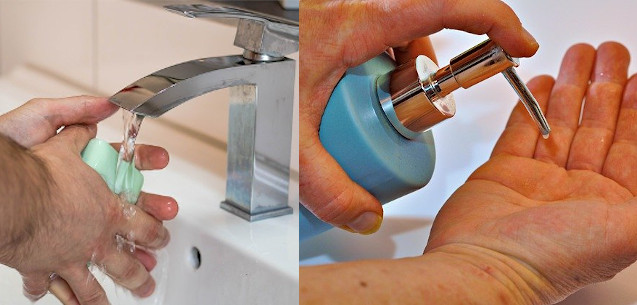It is undeniable that washing hands thoroughly with soap and water is the best way to protect yourself against contagious diseases.
SO WASH, WASH AND… WASH YOUR HANDS WHEN NEEDED, THERE IS NO SUBSTITUTE OF HAND WASHING.
When should you wash your hands?
Wash your hands frequently to stay healthy.
It has become more significant in the shadow of current pandemic of corona virus. One of the cheapest, easiest, and most important ways to prevent the spread of a virus is hand washing.
One should always wash hands:
- Before and after cooking food
- Before and after eating food
- After handling garbage / waste
- After using toilet
- After coming from outside from play, office, market, or visiting public places
- While changing diaper or attending a child who has used toilet
- After blowing nose, coughing or sneezing
- Before and after touching/ dressing any wounds or cuts
- Before and after attending sick persons
- After touching pets, handling pet food or their waste
Points to note:
- Washing hands is very simple. All you need is a source of running water, soap and towel.
- It is better to wash hands under running water.
- Important thing is to rub your hands after applying soap for at least 20- 30 seconds.
- Pay particular attention to area between fingers, under nails and back of hands.
- Drying your hands after washing them is also equally important because germs spread more easily to and from wet hands.
So parents, do not just ask your kids to wash hands, supervise and guide them in proper technique of washing hands.
But what should you do, when you are not near the sink? How can you protect yourself or at least reduce the risk of infection?
Here, a tiny bottle of good sanitizer comes to your rescue. Use sanitizer. It is more convenient when you are moving outside. So, my friends, always remember that
- A standard alcohol-based hand sanitizer (having concentration at least 60%) kills certain microorganisms like COVID 19, MESA, SARS, Ebola, Zika, HIV, influenza, E. coli, hepatitis B and C viruses. But it does not kill all types of germs or viruses. For example, sanitizers are not effective against norovirus, poliovirus, rotavirus, food and mouth disease, hepatitis A to name a few.
- The most critical thing to have in a hand sanitizer is its alcohol content. Recommended concentration in a good hand sanitizer to be effective is at least 60 % of alcohol. Any sanitizer having concentration between 60-95 percentage is fine. You can easily get this information from label of sanitizer. Higher the alcohol content, faster will be the action but it will be harsher to skin. A concentration of less than 60 percentage, may not kill germs but only retard their growth.
- To be effective take a quantity enough for full coverage of all the surfaces of both hands (about 3-5 ml), rub it all over both hands including spaces in between fingers, area under the nails and back of hands at least for 20 seconds. Allow it to completely evaporate, do not wipe hands until dry.
- Remember hand sanitizer is not a substitute of soap. So whenever you can, wash your hands with soap and water. In situations when you cannot wash hands, use hand sanitizer.
- According to CDC, the reason for why washing hands with soap and water is more preferable than hand sanitizer is basically related to:
- They do not get rid of all kinds of germs.
- Hand sanitizers do not work well on hands which are greasy or heavily soiled, a very likely occurrence during activities such as handling things, on job, playing sports, working outdoors, in the gardens or parks. Washing hands thoroughly with soap and water is recommended in such cases.
- Hand sanitizers also do not remove harmful chemicals, pesticides and heavy metals from hands. So it is very likely that the chemicals may enter in your body if you clean your hands with sanitizer after coming in contact with harmful chemicals.
- Improper techniques like using insufficient quantity of sanitizer, not covering all surfaces of both hands and wiping hands before complete evaporation of sanitizer.
- All alcohol-based hand sanitizers are flammable, including the gel type. It must never be used near any source of ignition.
- Swallowing alcohol-based hand sanitizers can cause alcohol poisoning if more than a couple of mouthfuls are swallowed. So keep it out of reach of young children, and supervise their use.
Hope you enjoyed reading.
Stay safe. Here is how to make hand-sanitizer at home?
Looking forward to your feedback!

